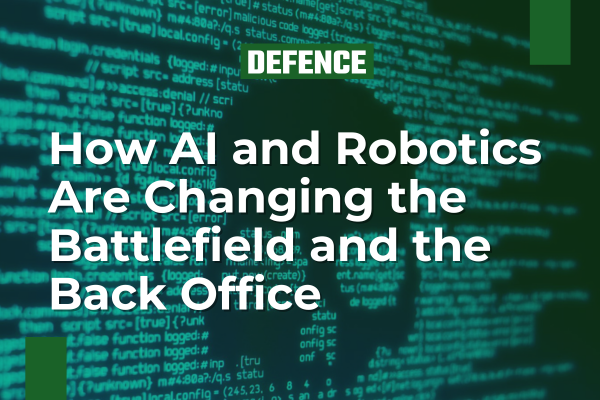How AI and Robotics Are Changing the Battlefield and the Back Office
03 Jun, 20252 minsThe Technology Revolution in Defence Artificial intelligence and robotics are fundament...

The Technology Revolution in Defence
Artificial intelligence and robotics are fundamentally transforming modern warfare and defence operations. From autonomous weapons systems to AI-driven logistics, these technologies are reshaping both frontline combat and back-office operations within the defence industry.
In late 2021, the Royal Navy partnered with tech giants Microsoft and Amazon Web Services to explore innovative approaches to warfare coordination, specifically examining the relationship between commando strike teams and shipboard missile systems. Working alongside defence contractors BAE Systems and Anduril, they developed "StormCloud" in just 12 weeks - a timeframe described as "unfathomably fast" in traditional defence procurement cycles.
The Talent Challenge in Defence AI
As defence organisations embrace AI and robotics, they face an unprecedented talent challenge. The competition for AI and robotics specialists has intensified, with defence contractors competing directly with tech giants and startups for the same limited pool of experts.
The Skills Gap
The defence sector requires specialists with unique combinations of skills:
- Advanced AI and machine learning expertise
- Understanding of robotics and autonomous systems
- Knowledge of defence applications and requirements
- Security clearance eligibility
- Domain-specific knowledge of military operations
This skill combination is rare, creating significant recruitment challenges for defence organisations. As one defence industry executive noted in a recent interview, "Finding people who understand both the cutting edge of AI and the specific requirements of defence applications is like finding unicorns."
Recruitment Strategies
Leading defence contractors are implementing innovative recruitment approaches:
- Defence-Tech Academies: Creating specialised training programmes that bridge the gap between commercial tech talent and defence applications.
- Partnerships with Universities: Establishing research collaborations and targeted degree programmes focused on defence AI applications.
- Alternative Career Pathways: Developing non-traditional entry points for tech specialists, including flexible working arrangements and remote work options previously uncommon in the defence sector.
- Competitive Compensation Packages: Rethinking traditional defence sector compensation to compete with tech industry salaries and benefits.
- Classified Research Opportunities: Highlighting the unique technical challenges that only exist within classified defence projects as a recruitment draw.
Upskilling the Existing Workforce
Beyond recruiting new talent, defence organisations are investing heavily in upskilling their existing workforce:
- AI Literacy Programmes: Ensuring all defence personnel have basic AI literacy and understanding
- Technical Transition Paths: Creating pathways for traditional defence specialists to move into AI-related roles
- Hybrid Teams: Developing team structures that combine domain experts with AI specialists
- Leadership Development: Training defence leaders to effectively manage and deploy AI-augmented teams
The Changing Nature of Defence Supply Chains
Geopolitical tensions and technological advancements are forcing a reassessment of traditional defence supply chain models. These disruptions require a new approach that integrates flexibility, technological innovation and strategic partnerships to create resilient supply networks.
UK Parliament research notes that "The world's geopolitical and trade landscape is increasingly volatile. Events such as the covid-19 pandemic and Russia's invasion of Ukraine, which has affected energy security, have exposed significant vulnerabilities in international supply chains."
Strategic Supply Chain Innovation
Leading defence organisations are implementing innovative approaches to supply chain management:
- Flexible Supply Chain Design: Using modular components and digital twins to enable rapid adaptation to new mission requirements. These systems can quickly incorporate emerging technologies and respond to shifting geopolitical landscapes.
- End-to-End Service Integration: Implementing comprehensive services from advanced manufacturing to AI-powered logistics management. This integration ensures seamless operations across the entire supply chain, reducing downtime and maintaining operational readiness.
- Strategic Logistics Partnerships: Forming Lead Logistics Partner (LLP) relationships for managing complex global supply chains, providing single-point accountability and proactive risk management.
AI's Expanding Role in Defence Systems
According to research from the Future of Life Institute, AI in military applications is increasingly replacing human operators rather than merely supporting them. While the Pentagon has emphasised AI to help humans and machines work together, the reality shows a trend toward automation of human decision-making.
This shift is changing the nature of military talent requirements. As automated systems take over certain operational functions, the skills required from human operators are evolving from direct control to supervision, strategic oversight, and ethical decision-making.
New Organisational Structures
The integration of AI and robotics is driving changes in defence organisational structures:
AI Ethics Boards
Many defence organisations have established dedicated AI ethics boards to ensure responsible development and deployment of AI systems. These cross-functional teams typically include:
- Technical AI specialists
- Legal and compliance experts
- Military ethicists
- Operational commanders
- Policy specialists
Human-Machine Teaming Units
Specialised units focused on optimising human-machine collaboration are becoming common, with responsibility for:
- Developing effective interfaces between human operators and AI systems
- Creating training programmes for human-machine teams
- Establishing operational protocols for AI-augmented operations
- Testing and evaluating new human-machine teaming approaches
The Path Forward
The UK defence sector is at a critical juncture where talent strategy directly impacts technological capability. Forward-thinking organisations recognise that their ability to recruit, develop, and retain specialised talent will determine their competitive advantage in an AI-driven defence landscape.
Those who successfully address the talent challenge - through innovative recruitment, strategic upskilling, and organisational adaptation - will be best positioned to leverage AI and robotics for defence applications effectively.
As defence operations increasingly incorporate autonomous and AI-driven systems, the human element remains essential but transformed - focused less on direct operation and more on strategic oversight, ethical governance, and creative problem-solving that AI systems cannot replicate.


